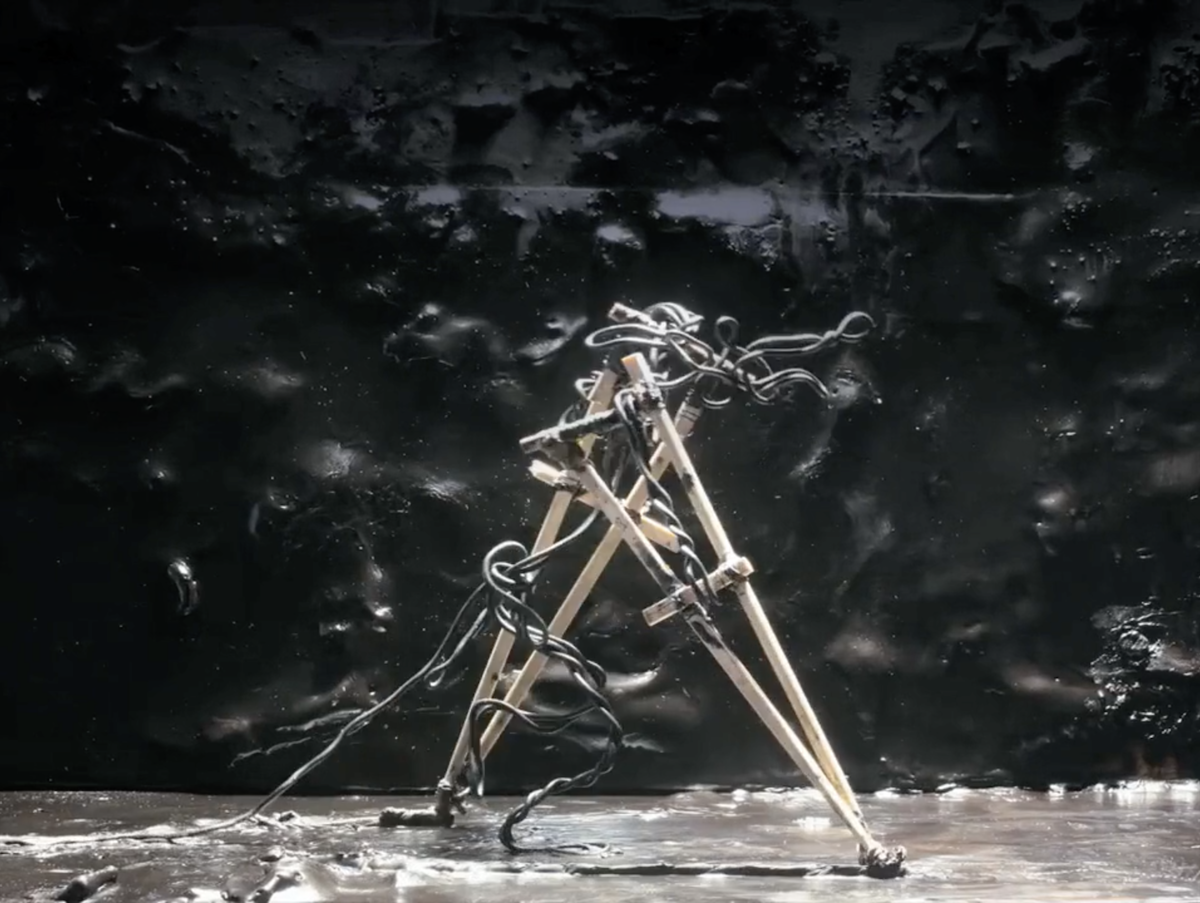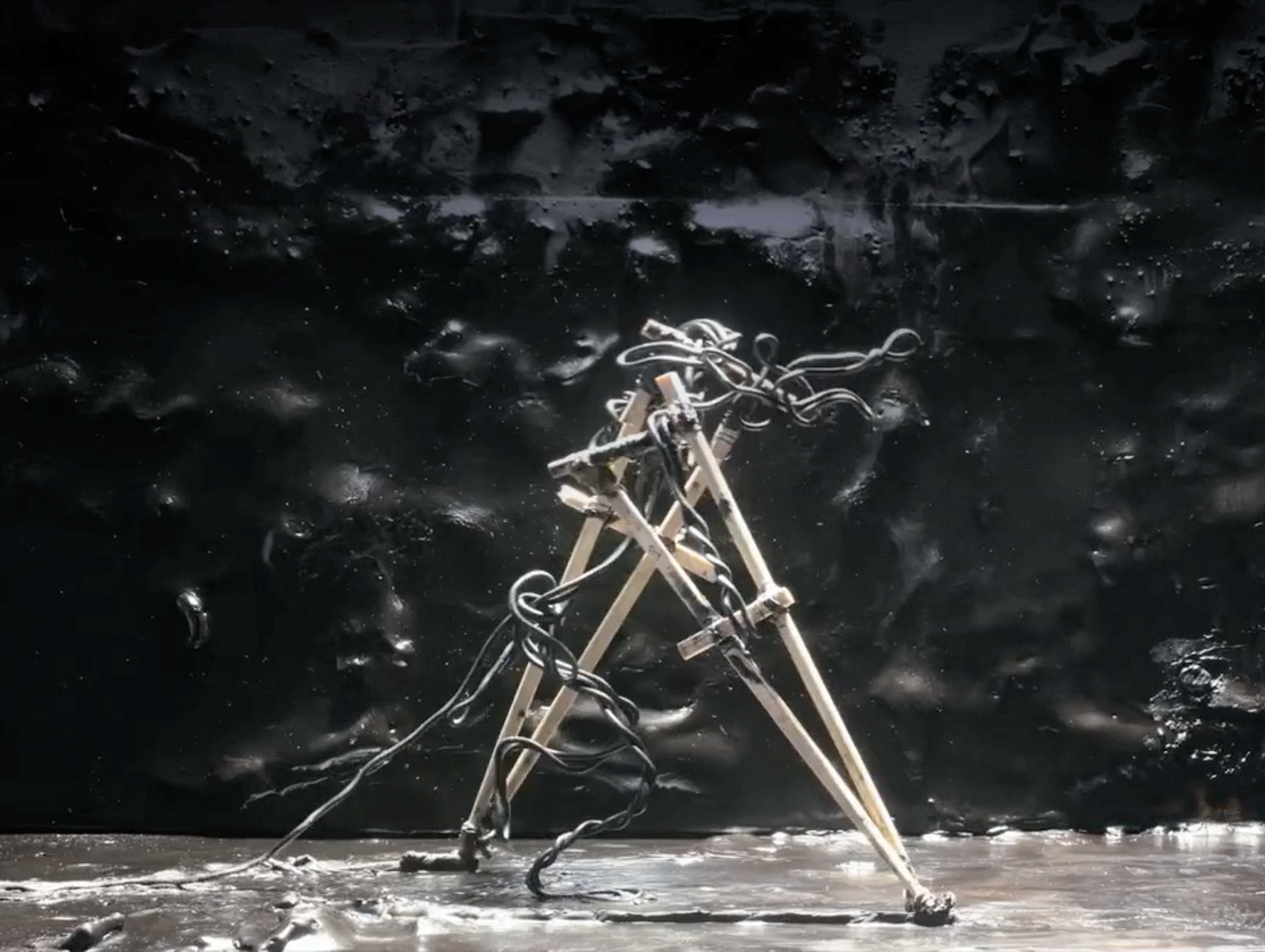Screaming from the Inside: Week #4
Untitled (Crutches)
Peter Wächtler
2013
8 Minutes
Artist Cinemas
Date
August 8–August 14, 2022
The silent video re-runs 12 seconds of animation, while in the subtitles a ranting monologue on harm and hurt unfolds. With every step the stop-motion animated wire figure on crutches engages deeper in an intimate soliloquy that keeps confusing past and present, cause and effect. Different scales of injury, from imagined war wounds, the public whipping of traitors, and hurtful discussions about open relationships at the Speaking Food Café all get mashed up by the relentless blurring of anxiety and isolation. The phrase “I’ve been in deeper shit before” works as a chorus line structuring the text in passages of violent hubris and fearful prostration. Yet, despite the threads, the fury and all the enemies, lovers, and buddies the figure moves on in an abstract landscape of slushy wax in solitude and silence. Unable to enter any learning curve with his manly mantra of “deeper shit” he loops away in frailty to a “place I cannot imagine,” where the plants “laugh at all the cutting shit things in this world.”
Untitled (Crutches) is the fourth installment of Screaming from the Inside, an online program of films and accompanying texts convened by Camille Henrot as the eleventh cycle of Artist Cinemas, a long-term, online series of film programs curated by artists for e-flux Video & Film.
The film is presented alongside a text response by Estelle Hoy.
Screaming from the Inside runs in six episodes released every Monday from July 18 through August 29, 2022, streaming a new film each week accompanied by a commissioned interview or response published in text form.
Year of the Rat
By Estelle Hoy
If repetition in film still offers a useful model for the contemporary art world, it’s because of its capacity to create images that move in relation to so many other competing movements—passages of time, erotic drives, shifting power relations, the motion of war, intrinsic psychic shifts—and since its specific way of moving (or not moving) has everything to do with our inherent failure to learn from the past. There’s a rumor going around that Peter Wächtler’s first solo show as an artist sold out before it opened, and rumors are almost always true. For a lifetime supply of sweet Sterkert Eggnog— an egg milk punch famous in West Germany—Wächtler handed over his work to the giant corporation at the expense of anyone else getting tickets. To be fair, he was twelve at the time, but gossip has it he was an “old twelve” and should have known better. The Chinese whispers of milky dreams are adorable at first until you realize an enormously unjust power dynamic was playing out. He sold out by selling out, sure, but he didn’t go on to repeat this. Instead, Wächtler introduced another version of repetition: repetition as remonstration.
In the silent Untitled (Crutches), Wächtler casts a deranged, wiry rodent (the spleen of the animal kingdom) limping pathetically on matchstick crutches toward an end that never arrives. More precisely: an end that arrives at the beginning. The rat’s rhythmic, circular means of intervening in the world is an eight-minute stutter of movement. A slurring, faltering, shuffling, silvery gerbil that leads the viewer into philosophical contemplation of humanity’s ongoing, most consequential fight: the way it should have been but wasn’t. It’s a statement that’s potentially a weapon, an occupation, but more likely a machination of defeat. The deranged gerbil delivers a Tourette-like monologue addressed to his ex-lover who left him behind for greener pastures, presumably escaping the relentless power-battle of love to strategize for a different kind of freedom. In a fitful lamentation, the rat makes clipped, nervous, stop-start statements as though in a confessional booth with a walkie-talkie and a buffalo, concluding his admissions with a suggestive mantra: “I’ve been in deeper shit before.” And he has, but we’ll get to that. The woeful figure doesn’t make much progress; inhibited by literal and figurative crutches, he howls anguished lines of loss and grief, occasionally peppered by a joyful reminiscence of the future-past, clutching at rosier versions of it for himself. “Where the flowers blossom all year long. Where the horses run free and wild. Where birds are flying wild and free. Where hunting is ok because there are so many animals and they pose in front of the hunters. The hunters respect the animal’s soul.”
Dialogue less installed than inflicted, striving to convince himself more than anything. The words jump-cut between damage and damage-control, trying to re-narrate the past with a gold-tipped pen, attempting to hold onto power and that elusive upper hand, but failing miserably. The fingerprints of love lost are still fresh and plaintive on the walls of his heart, a vermin’s pesky inertia he cannot find his way out of, mutating his sense of a plausible present and an etiolated past. The rodent’s seizures and musings are punctuated with an onomatopoeic hhnnnnnng, a kind of mnemonic device that desperately clings to a desire to remember a history that casts him in a favorable light. It’s something we’ve long pursued, a retrieval we’ve mostly mastered; and Wächtler, with his general penchant for laboring animals, reveals this distorted personal and collective repetition. The worst thing about memory is that it exists, says the Year of the Rat. While waiting for Godot and a mediocre valentine, the rat pre-exists its own production budget, cutting costs and facts to present a version of reality that he can live with.
Inside the rat-maze, we now learn that our molting protagonist has, most certainly, or maybe, been in deeper shit before… much deeper: the fucked-up mud festival that was the Korean War. The obscene, ugly, dumb war, also called the “625” (which also happens to be the exact number of personalities that Kim Il-sung had), becomes a loathed labyrinth of memory that the rat must navigate and resolve. Looking for wheels of bloomy Camembert in a maze of endless electrical currents, misleading propaganda, nuclear reactors, reaction-formations, and deadends is a historical repetition that we, individually and collectively, can’t seem to stop doing. (Ukraine is an unfortunate parallel here.) Wächtler turns the wheel of delusional repetition on its head in Untitled (Crutches) with a powerful, practical, searching protest: finding a form to accommodate this mess. An occupation I can actually get behind.
Shifting boundaries like a borderline, inspired by memory or revenge, the film enacts a nimble politics of cut and paste, guerrilla polity, fission, and static détournement. Strutting past himself while short-circuiting, the rodent is a walking (hobbling) publicity stunt begging us to re-negotiate, revise even, the movements we repeat time and time and time again. Which seems like due diligence but isn’t. Disasters of love and war are supplanted by planted memories chronically searching for a bearable armistice, for a cogent, admissible truce. Though in agonizing actuality, ours is a dishonorable discharge of enduring complicity in lopsided, zig-zaggy battle royals—arriving five or ten minutes late to the realization that we ourselves abet the power mechanisms so off-handedly, it could hardly be less spectacular. Untitled (Crutches) is part of a curdled trilogy of animated films—Untitled, and Untitled (Heat Up the Nickel)—all three works born under the sign of charm, starkly illustrating this cataclysmic condition, each trapped inside a nauseating, ambitious loop-de-loop of limping objection. On a sticking record player in Untitled, our depleted, melancholic rat (who has excellent taste in music, by the way) repeats the words of Bruce Springsteen’s “The River,” silent, lyrical interventions from the injured, tried-and-true working class: “I come from down in the valley / Where, mister, when you’re young / They bring you up to do like your daddy done.” A poetic bridge living somewhere between conviction and trepidation, a sober, unpretentious vernacular that Peter Wächtler not-so-gently reminds us is actually the chorus. He’s very pushy.
After ratting us out in Untitled (Crutches) with eight minutes of repetition, clumsy non-progress, collateral damage, and philosophical crutches, what is perfectly clear and within our range of vision is an attending post-chorus proposition:
The way it should have been but wasn’t. / The way it can be.
Or maybe he just needs a shrink.
-
Estelle Hoy is a writer and art critic based in Berlin. Her second book, the critically acclaimed Pisti 80 Rue de Belleville (After 8 Books), was released in 2020 with an introduction by Chris Kraus. Her forthcoming book of essays will be released by After 8 Books in 2023. She is currently collaborating on a book and exhibition with Camille Henrot for ICA Milano. Hoy regularly publishes in the international art press.
For more information, contact program@e-flux.com.


